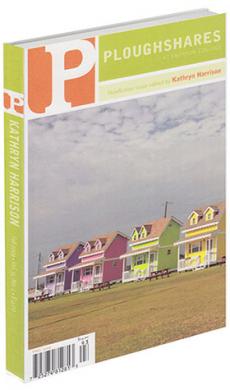Introduction
1991. A summer storm blows up the coast of Delaware, rearranging the tide on Rehoboth Beach. My husband’s parents take our baby daughter inside, into the house they’ve rented for the week, a box of windows resting on stilts. Released from responsibility, from adulthood, the two of us run into the ocean and give ourselves to the current. Let it pull us, fast, up the coast. By the time we fight our way out and onto the sand, we’re four, maybe five hundred yards north of where we entered the water. Wind flattens the cord grass; the horizon has disappeared, and in its place lightning flickers. We run back to where we started, rain hissing on the sand and hitting our bodies hard enough to hurt, and go back into the sideways racing waves, no longer green but black. Again, the riptide yanks our feet out from under us, pulls us up the beach under the glowering sky. We do this dangerous thing over and over, until we are too tired to stand.
2009. We cross the Atlantic Ocean, my husband and I, and on our first day at sea we find a paddle tennis court on the ship’s thirteenth deck. Like an aviary, the court is netted all around to prevent balls from flying off into the water. No one else is on deck—it’s too windy, too cold, the captain has asked all passengers to remain inside—and we play in jeans and overcoats. Heading into a storm, the ship pitches underfoot; wind comes at us from every direction, tearing at our clothes. I strike wildly at my husband’s serves, the Day-Glo yellow ball snatched off course by unpredictable gusts. We’ll play, my husband says, until we manage a volley of four shots. By the time we do, I’ve discarded my scarf, coat, and sweater; I have a blister on my left heel. My husband, like his father, who taught me to play tennis, has remained standing center court and fully dressed, drilling balls to my weak backhand and running me over every inch of my side of the net.
What divides the two scenes? Eighteen years. The death of the grandmother who raised me. The birth of two more children, a boy, a girl. Books written, books published. A serious illness, a stay in an Italian hospital: a vacation in Tuscany ruined. Depression, the kind that lands me in a different kind of hospital. A cat, and then a dog. Jobs left, other jobs taken. Another medical emergency, this one our son’s. The death of my husband’s father. Two more cats, a rabbit, and yet another cat—no more pets, I promise my husband. The eldest goes off to college. The house feels different without her. Eighteen years divide the scenes, and yet they are connected; they stand as bookends to all that came between.
These twenty essays: their authors are male, female, younger, older. They’re married, divorced, gay, straight, single, partnered. They’re parents, grandparents, or they’re childless. They live in Florida, in New Jersey, Massachusetts, Texas, New York, Michigan, Indiana, Louisiana, California, Ohio. For a few of the twenty, this issue of Ploughshares will be a first publication; others have had too many to keep count. I know some of the writers; one was a student with me in Iowa, twenty-four years ago; two were my students; one is a colleague. A few I’d never met but, having long enjoyed their work, I took the opportunity as guest editor to write them fan letters disguised as requests for a submission. Others were happy discoveries.
What connects these narratives is that they are true, and represent a struggle, a particular struggle whose value I can’t overstate. The author of each labored to put words to his or her experience. To articulate it, to speak it, to write it honestly, which requires something more than effort. Each made a commitment essential to writing about one’s own life, a promise that goes far beyond the act of writing.
Is the personal essay a narcissistic form? Not when it succeeds as art. Narcissus perished because he fell in love with his reflection. The twenty writers whose work is collected in this volume pushed past the masks all of us present to the mirror, the neighbor, the spouse. The commitment they’ve made is to report what they find under the surface of their lives no matter how disappointing, threatening, or admirable. Because our virtues are difficult to own, perhaps even more than our faults.
I can’t separate the work of editing this issue from teaching memoir at Hunter College. For two years of workshop, M.F.A. students struggle, and evolve. A few begin to write in a way that humbles a teacher, shows her the limits of her influence. I know I’m watching a transformation—not the result of assimilating lessons or learning tricks of the craft but something more crucial to their aspirations. They acquire the habit of self-scrutiny, a willingness to vivisect the conceits we all hold dear. Without that willingness, it isn’t possible to answer the first demand of consciousness, and of conscience: that we know ourselves.
In order to write our lives, we have to be willing to see them. More often than not this means drawing as close as we can to events, transactions, emotions, even thoughts we’ve previously avoided. The reward for bearing witness to what we refused to contemplate while it unfolded—the reward for accepting the discomfort of consciousness—is the invitation art extends: to shape and give form to, to manipulate, the very things that once held us in their thrall.
It’s no small accomplishment to choose among the almost limitless rubble of experience and find the right words to recreate what we remember. To communicate the gestures that best reveal character. Harder still if the character is the fencing teacher who molested you, the father who spent fourteen years on death row, the refugee seeking asylum from his homeland’s tribal warfare, the mother who committed suicide, the husband you cheated on, the wife and children you left, the self who failed them. Was failed by them. We complicate our lives, with our passions, our mistakes. It makes for good stories.
The two scenes? I mean them to evoke the life I write and, in writing, own. A body of water. A stinging wind. Time stolen from work, from parenthood. Enough snarls in my hair to require an hour’s patience with a comb and brush. The seriousness belied by games we play where we are reminded of drowning, of death, defiantly alive. Alive and defiant in the consciousness of mortality, in remembering and putting words to experience. Preserving what would otherwise be lost, transforming it into something, like a spark traveling between synapses, that lives between the one who writes and the one who reads.

